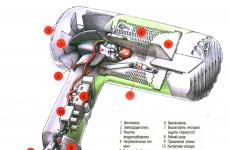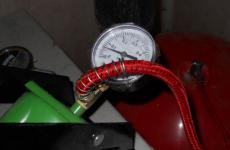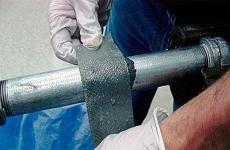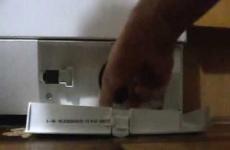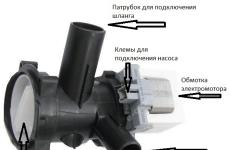For what reasons does the pressure drop in the heating system of a private house?
House heating scheme
It is rare in any modern private house that you can find a Russian stove, used not only for cooking, but also for heating the house. In recent years, closed-type heating schemes using gas equipment have rapidly developed. Unfortunately, even with an excellent installation, sometimes there is a pressure drop in the heating system of a private house.
A similar problem can appear even in a new system, although it would seem that this is not possible. But it turns out there are many reasons for this. In order to understand them, you need to know the structure of the water system.
How is the water heating system of a private house arranged?
The main equipment for the installation of heating is the boiler. It is necessary for the transfer of thermal energy, which is released during the combustion of fuel, to the coolant moving through the pipes.
Depending on the type of boiler, the following can be used as fuel:
- natural gas;
- firewood;
- coal;
- peat.
Heating schemes have been developed and are successfully applied, where electricity is used as a heat source. But this method is expensive, albeit the safest.
Note! When installing heating equipment, an expansion tank must be installed in front of the boiler. It is used to balance the pressure of the coolant.
Expansion tank operation
The pressure stabilization device has a membrane that separates the working space with air. The function of the expansion tank in the heating system is to take in the surplus heat carrier, which is formed due to expansion during heating, and give it back to the system during cooling.
When heated, water expands, and the pressure in all pipes and heating devices increases, and the excess volume flows into the tank. In this case, the membrane is stretched, and the volume of air decreases, that is, it is compressed. This increases the pressure in the system.
With a decrease in the temperature of the coolant, its volume in the system decreases, the pressure decreases, and thus the water that was previously taken into the tank is pushed out of it by compressed air.
Heating indoor air

Pipes are bred to radiators in various ways
The room is heated thanks to radiators installed in each room. Depending on the material used, they can be steel, aluminum, cast iron and bimetallic. Bimetal batteries have excellent heat transfer and excellent appearance.
Water enters the heating devices through a branched pipe system. To ensure uniform and fast movement of the coolant, as well as, use a circulation pump. There are also systems with gravity flow of water.
Important elements are drain taps, drain valves, shut-off valves and pressure gauges.
Why does the pressure in the heating system change?
Different pressures in the heating system arise for a number of reasons:
- Coolant leak.
- There is air in the system.
- The use of aluminum radiators.
Coolant leak
Very often it can come from connections, expansion tank or batteries. The loss of water occurs in places affected by corrosion, that is, from where there is rust.
The option of a leak through a torn diaphragm of the expansion tank cannot be discarded either. In this case, you can check the leak by pressing the nipple at the top of the tank. If water and air are released, then there is a coolant leak. Only air should be normal. If you have checked the entire line, all the joints, and there is no leak anywhere, then the pressure drop problem is related to another cause.
There is air in the system

Air locks in the battery
The reasons for the appearance of air jams can be different:
- Violation of technical requirements when filling the system with a coolant.
- Poor water preparation before filling the system, that is, there is no unit for forced removal of air dissolved in the coolant.
- Ventilation of the coolant, when air is sucked in with loose connections.
- Abnormal operation of air release devices - when the valve is clogged or not adjusted.
Air pockets in heating systems result in noise. This phenomenon is not only unpleasant for residents of a private house or apartment building, but also harmful for heating.
The presence of air in heaters and pipes leads to more dangerous problems:
- During noise, the pipeline vibrates, which loosens threaded connections and destroys welds.
- The system is poorly vented, which does not allow it to be adjusted and can lead to the cessation of the circulation of the coolant in individual batteries or risers. In this case, defrosting of the system is quite possible. And if the movement of the coolant does not stop completely, then the efficiency of the heating circuit decreases, and the fuel consumption increases.
If air forms and enters the pump impeller, it may be damaged due to the resulting load.
There are several methods for keeping air out of the system.

House heating
How to avoid air entering the heating system?
- It is necessary to correctly commission the assembled heating circuit. This must be done by a specialist. Before starting, you need to inspect both the system as a whole and each connection, taps and valves, assessing their performance. Very often, during inspection, the shut-off valve in the boiler is left unattended, although it can also allow water to pass through.
- The system must be pressure tested. To do this, the compressor must supply pressure 25% more than the working head of the coolant. If within 20 minutes its strong decrease does not occur, then the system is installed well and can be put into operation. But if the pressure drops, then a leak has occurred, which must be detected and repaired. Loss of water can be indicated by a characteristic whistling sound. It can also be determined if the joints are coated with soapy water. The release of bubbles will occur in the places where the coolant passes.
- The system is filled with cold water and gradually. Before starting, you must open all the taps to drain the water. If possible, unscrew the plugs in the batteries and bleed the air from the system. If the design allows, then open the valve to bleed the circuit.
The network pump is started last, and if everything is done correctly, then the heating system does not need forced air discharge. An insignificant amount of it will be released through the auto-valve and Mayevsky taps installed on each battery. After bleeding the air, you need to add the coolant to the working pressure in the heating.
During operation, situations arise when air appears in the pipes. To eliminate it, you must perform the following steps:
- Determine the possible location of the air plug. If present, the battery or pipe becomes cold.
- Find a point in the heating a little further and higher along the course of the water flow - where there is an air valve or faucet. It is necessary to release air through it by turning on the make-up of the system.
Application of aluminum batteries

Installation of aluminum radiators
When water comes into contact with aluminum, a thin film forms on the metal surface. This produces compressible hydrogen as a by-product. And due to this, the pressure is reduced. But this phenomenon does not happen all the time, but only in new radiators. Over time, it stops, and the problem is solved by itself.
Along with a decrease in the pressure in the pipeline of one's own or a multi-storey building, its growth can also occur.
The reasons for the pressure increase in the boiler can be different:
- Breakdown of the boiler feed valve. In it, the rubber seal may sag or simply become coarse. After identifying a defect, it is necessary to replace the gaskets.
- Heat exchanger is leaking. To check, you need to dismantle the boiler and test it with air. If a breakdown is detected, the part must be replaced with a new one.
When repairing the boiler, unplug it and turn off cold water.
Conclusion
To eliminate the causes of an increase or decrease in the pressure in the heating system of housing, it is necessary to initially correctly design the system and, during its installation, strictly follow the sequence of actions without deviating from what was intended. If you notice that the pressure in the heating system is increasing, you should immediately contact a specialist in order to prevent equipment damage.

